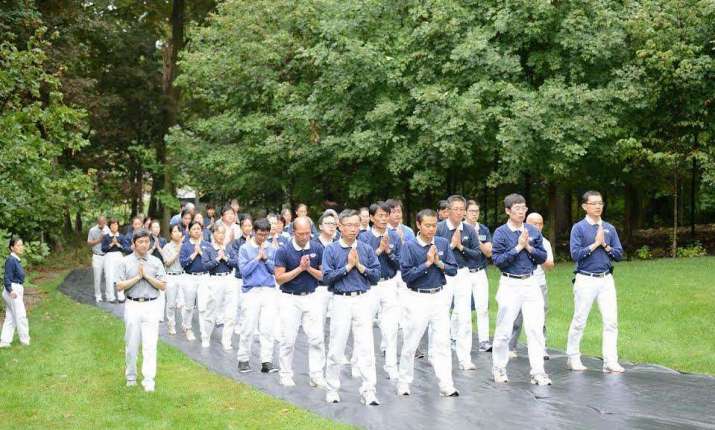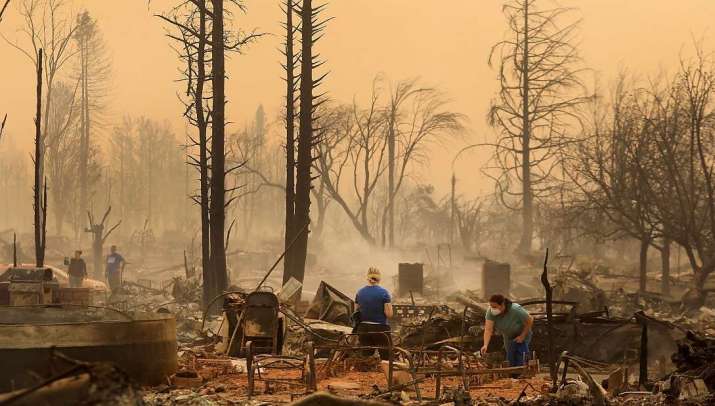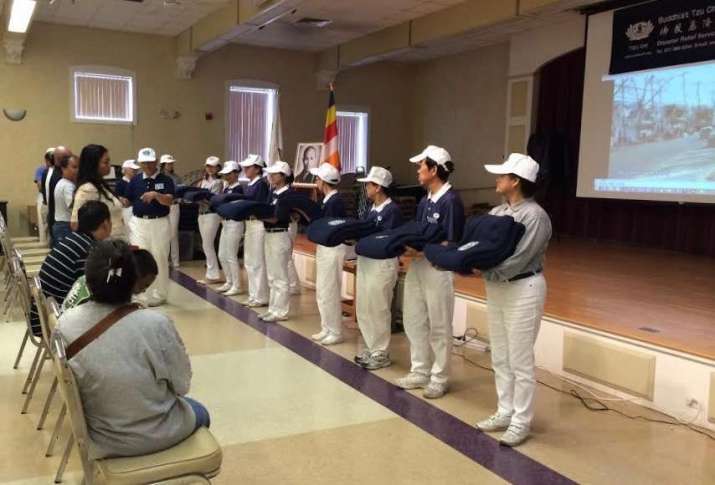FEATURES|COLUMNS|Buddhism in America (inactive)
The Compassionate Relief of Tzu Chi – Inspiring Great Love in the United States and Around the World
 Members of Tzu Chi Boston. Image courtesy of Tzu Chi Boston
Members of Tzu Chi Boston. Image courtesy of Tzu Chi BostonThe American cultural anthropologist Margaret Mead famously said, “Never doubt that a small group of thoughtful, committed citizens can change the world; indeed it’s the only thing that ever has.”
In 1966, Taiwanese Dharma Master Cheng Yen and a small group of mostly housewives founded a charitable mission. Decades later, that mission would grow to reach millions of people around the world. They probably weren’t thinking of the recent devastating wildfires in Northern California, or the hurricanes in Texas, Florida, and the Caribbean, yet the now international organization, with volunteers in 56 countries and regions, is pouring their master’s love into the lives of many Americans suffering under the onslaught of recent natural disasters.
Although there are many charities and relief organizations, Tzu Chi offers an impressive and humbling outpouring of Buddhist compassion in direct and distinct ways. The following is a recent interview with Jiuan Ng, a volunteer and director of the Boston Service Center for the Buddhist Tzu Chi Foundation.
Buddhistdoor Global: How does Tzu Chi live the master’s teachings?
Juian Ng: Master Cheng Yen firmly believes that suffering in this world is caused not only by material deprivation, but, more importantly, also by spiritual poverty. She feels that the lack of altruistic love for others has been the root of many problems in this world. Thus, the foundation’s guiding principle on charity is to “help the poor and educate the rich.”
Tzu Chi’s missions focus on giving material aid to the needy and inspiring love and humanity in both givers and receivers. In addition to charity, the foundation dedicates itself in the fields of medicine, education, environmental protection, international relief work, and the establishment of a marrow donor registry. It also promotes humanistic values and community volunteerism. Through helping those in need, Tzu Chi volunteers take on the path of bodhisattva practices; the way to Buddhahood.
BDG: How does Tzu Chi find out about disasters?
JN: Many different ways: from the news, from other organizations, and people who know about Tzu Chi. There are Tzu Chi volunteers in 50 countries and Tzu Chi has conducted disaster relief in more than 85 countries.
Dharma Master Cheng Yen leads a group of volunteers at the headquarters in Hualien, Taiwan, monitoring the world news everyday. She constantly cares for the well-being of all sentient beings.
 Victims of the Northern California wildfires sift through the remains of their home. From cnn.com
Victims of the Northern California wildfires sift through the remains of their home. From cnn.comBDG: How does Tzu Chi honor the people it serves? Can you describe why you feel people offer Tzu Chi volunteers the opportunity to gain wisdom?
JN: Whenever disaster strikes, whether at home or abroad, Tzu Chi volunteers act quickly to serve those affected with a spirit of gratitude, respect, and love. Tzu Chi believes that people who are in need give us the opportunity to see and understand the meaning of impermanence and suffering. Thus, it is the volunteers who gain the most by cultivating wisdom from our compassion toward people. Therefore, Tzu Chi volunteers show the utmost respect to people in need during disaster relief.
During distribution ceremonies, volunteers spend time listening to and comforting those affected by disasters, and presenting goods to those affected with a respectful bow to show our gratitude.
BDG: Why was Tzu Chi allowed into Myanmar? Can you give some details of the circumstances? I know it was related to the prior work of Tzu Chi being recognized.
JN: After the 2008 cyclone in Myanmar, Tzu Chi received permission to set up a distribution center at a Buddhist temple in Yangon and work with the monks there. Tzu Chi was able to enter Myanmar due to our principal of political neutrality: our volunteers simply wanted to help the cyclone victims and provide relief from the disaster as soon as possible. Myanmar also saw what Tzu Chi did in many countries after the 2004 Indian Ocean earthquake and tsunami, and recognized our principals and pure compassion.
BDG: Why does Tzu Chi also serve the police and fire services? What is the motivation around that?
JN: First responders are vital after a disaster, however their tireless work is sometimes taken for granted by the general population. Tzu Chi relief volunteers want to pay special attention to this group of individuals who serve with selfless dedication, and organize additional disaster aid distributions specifically for them. These public services are very often the groups that need help but are less vocal about it.
BDG: What is the significance of the volunteers paying their way when they travel to do relief work?
JN: The money collected from fundraising represents the love and care of everyone who made the donation. Therefore volunteers want to make sure this money goes to the people affected by disasters.
BDG: I understand that when there is a disaster, Tzu Chi can change the financial structure of relief efforts in terms of how finances are managed. Could you please elaborate?
JN: In the event of a major disaster, Tzu Chi may establish a disaster-relief fund in which all donations earmarked “disaster-relief fund” during a specific period are prioritized and used to aid that particular disaster. After the immediate relief effort, volunteers will begin to roll out mid- and long-term relief work wherever needed.
It is worth mentioning that Tzu Chi will remain in a disaster zone for as long as needed. For example the 2010 Haiti earthquake: Tzu Chi has still not left, since Haitians still need a lot of help to rebuild their lives—even a better life than before, with compassion and wisdom!
 Tzu Chi disaster relief volunteers. Image courtesy of Tzu Chi Boston
Tzu Chi disaster relief volunteers. Image courtesy of Tzu Chi BostonBy living the words of Taiwanese Dharma Master Cheng Yen, Tzu Chi volunteers are healing the wounds left by recent disasters in the US with tremendous grace.
See more
Tzu Chi USA
Tzu Chi Boston
Buddhist Compassion Relief Tzu Chi Foundation
Related features from Buddhistdoor Global
Buddhistdoor View: Involving the Young in Hong Kong Buddhism—No Easy Route
SGI and Environmental Care: Nurturing Bodhisattvas Who Will Help Save the Planet
Reviving a Vietnamese Family Tradition – The Trantien Foundation














